US Politics 55
A second inauguration on January 20th?

A second inauguration on January 20th?
Outgoing President Donald Trump is organizing a “second inauguration” online at the same time that Bidel will take his oath of office and officially begin the term of 46th U.S. President, Democrat Joe Biden
 Author Juana Carrasco Martín | juana@juventudrebelde.cu
Author Juana Carrasco Martín | juana@juventudrebelde.cu
December 22, 2020
Translated and edited by Walter Lippmann for CubaNews.

People have spoken, says cartoonist Author: Juventud Rebelde Published: 22/12/2020 | 12:34 am
The height of irrationality among supporters of outgoing President Donald Trump: they are organizing a “second inauguration” for him, on January 20, at noon, at the same time that he will be sworn in and officially begin the term of 46th U.S. President, Democrat Joe Biden.
Trump’s inauguration will be online and can be considered a provocation and probably a violation of constitutional norms, but there they go proclaiming that it is their right “to freedom of expression.”
As social networks endure everything, more than 60,000 Facebook users are promoting the event they have called “Donald J. Trump’s second presidential inauguration ceremony,” and they claim in a “disclaimer” that they are a sum of 325,000 private individuals, not affiliated with any formal organization, who want to show their support for “President Donald Trump”.
In the face of such ignorance of the popular will expressed in the ballot box and the certification of the Electoral College, Facebook has simply issued another “disclaimer”: “Joe Biden is the president-elect. He will be inaugurated as the 46th president of the United States on January 20, 2021.”
As reported in The Hill, the event will be hosted by Ilir Chami and Evi Kokalari, who was allegedly part of Trump’s 2020 campaign and is featured in regular on right-wing news networks such as One American News Network.
In a recent post on the Facebook page, Kokalari re-posted Facebook’s disclaimer, writing: “Our voting rights are under attack! So is our freedom of speech! And FB’s disclaimer in this post proves it.”
One could not expect less from these fans when Trump has not recognized himself as a loser and continues to encourage such false news and disruptive actions.
Rumor has it that in his obsession with staying in the White House he seems to have in mind appointing attorney Sidney Powell as special counsel to investigate allegations of voting fraud.
For identification purposes, Powell was separated from the Trump campaign in November when he was mocked for claiming that there was a broad “national conspiracy” to deny the current president victory and an “immense influence of communist money from Venezuela, Cuba and probably China” that interfered with the elections, in addition to claiming that the voting machines used were “created in Venezuela by Hugo Chávez” to ensure that he would never lose an election.
At the time, Rudy Giuliani, Trump’s personal lawyer, had said in a statement: “Sidney Powell is practicing on her own. She is not a member of Trump’s legal team. Nor is she an attorney for the President in her personal capacity.”
Now, that statement comes crashing down. Desperate Trump put her in the ring and provided evidence that anywhere in the world psychiatry would have already rendered a verdict of committal or at least strong treatment of insanity.
From the “Monkey Trial” to Our Times

From the “Monkey Trial” to Our Times
In July 1925, 95 years ago, in the small town of Dayton, Tennessee, the so-called “Monkey Trial” was held. It all began with the arrest of teacher John Scopes, who was accused of explaining to his high school students Darwin’s Origin of Species.
By Abel Prieto Jiménez
July 17, 2020
Translated and edited by Walter Lippmann for CubaNews.
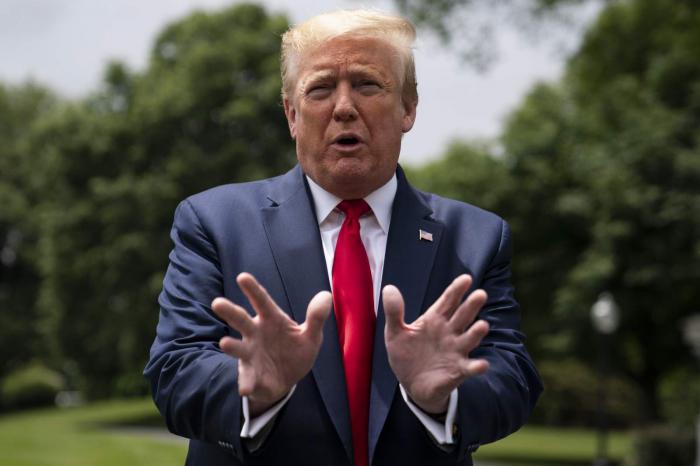
The same irrational obstinacy of Darwin’s deniers reappears in Trump’s dismissive attitude towards science and scientists and in his erratic and criminal response to the pandemic. Photo: AFP
In July 1925, 95 years ago, in the small town of Dayton, Tennessee, the so-called “Monkey Trial” was held. It all began with the arrest of teacher John Scopes, who was accused of explaining to his high school students Darwin’s Origin of Species.
He had violated a Tennesee law that forbade “the teaching of any theory that denies man’s Divine Creation as it is in the Bible, and replaces it with the teaching that he is descended from an order of lower animals.”
Many local people demonstrated in the streets with signs and shouts in favor of their religious values and against Scopes and Darwin himself, whom they saw as representatives of the Devil.
From the caricatured simplification of the thesis of evolution (“we are descended from the monkey”), the name with which the trial passed into history was born. It received great publicity in its time and ended up being presented as a duel between two sides, “creationists” and “evolutionists”, and between two prestigious lawyers.
The press in the North showed the clash between a world view that was typical of “deep America”, closed in itself, rural, moralistic, anti-scientific, very religious, and another “free thinker”, open to the debate of ideas and the advances of science.
Scopes was finally found guilty; although he was only sentenced to pay a fine and did not go to prison, as the prosecutor and the extremist sectors of the people wanted.
A theatrical piece based on the trial was released years later, and from it several versions were made for film and television. The sympathies in these plays tend to be on the “liberal” side, although, as in the U.S. entertainment industry, there is no serious investigation into the real causes of the conflict.
Within the questionable and undemocratic US electoral system, “Deep America” contributed decisively, in 2016, to Trump’s victory.
In that space, more cultural than geographical, analysts locate the “hard” electoral base of the ultra-right, associated with the stereotype of the white, Protestant, sexist, homophobic, illiterate, racist, hunter and gun lover, attached to Republican politics, the most conservative morality and the traditional concept of the family. With an exalted and messianic image of his country, he lacks curiosity about universal culture and that which thrives in New York and other US cities with a cosmopolitan vocation.
Joe Bageant wrote an incisive, exceptional book, Chronicles of Deep America, in which he characterizes the scam of the Yankee model and denounces the decline of the Empire on a planet controlled by corporations. His description of “that provincial America,” inhabited by churchgoers who “fanatically listen to the pastor explain the infallibility of the Bible in relation to all known matters, from biology to baseball rules,” and “are not even able–and do not care much about–to put Iraq or France on the map, assuming they have one, is very valuable.
Many believe that Trump is addressing this hard core of voters most of the time, in his speeches, in his tweets, in his permanent show.
The same irrational obstinacy of Darwin’s deniers reappears in Trump’s dismissive attitude toward science and scientists and in his erratic and criminal response to the pandemic.
Trump has also exceeded the political use of the Bible. On June 1, he ordered the removal of anti-racist protesters to walk through a park to St. John’s Church and “hold up a Bible in front of the cameras, like some kind of championship trophy,” as one journalist ironically put it.
Mariann Budde, the bishop of the Episcopal diocese of Washington, said: “It was traumatic and deeply offensive. Something sacred was misused for a political gesture.
Last Friday, in Florida, at the Doral Jesus Church Worship Center, a refuge for terrorists, in a shameful rally where he avoided talking about the health catastrophe, Trump mixed internal and external enemies under the “caused” word socialism. The Democrats, he said, are standing alongside those who are knocking down statues. And he accused them of wanting to do the same with the statues of Jesus Christ.
An evangelical Christian of Cuban origin went so far as to say that Trump is “God’s chosen one” to stop the communist threat in the United States.
Let us remember that in the 2016 campaign this “chosen one” used inquisitorial language to refer to Sanders and Hillary Clinton: “He made a pact with the devil. She is the devil.” This is the kind of medieval insult used in 1925 by the people of Dayton to attack Scopes and Darwin.
The gesture that makes Trump uncomfortable

The gesture that makes Trump uncomfortable
The protests against racism, supported in different latitudes of the planet after the assassination of George Floyd, have also gained strength in the field of sport
Author: Alfonso Nacianceno | nacianceno@granma.cu
June 10, 2020 00:06:46
Translated and edited by Walter Lippmann for CubaNews.

Donald Trump attacked the Black football players, members of the well-known NFL, because a group of them were kneeling on the ground to hear the national anthem, in protest against racial segregation.
U.S. law requires the military to perform its usual salute. All other citizens, including athletes, must remain standing, facing the national flag, with their right hand resting on their heart, while the anthem is played.
By not following this guideline in different facilities, Trump, although there was no clause in the NFL regulations, pressured the organization’s directors to punish all players who expressed themselves in this way against racism and inequality.
In light of the current events in the convulsed American scene, when this Tuesday would be the burial of George Floyd in the middle of the incombustible protests, the United States Soccer Federation (US Soccer) will open a debate to on ending the controversial rule of prohibiting its athletes from taking a knee during the playing of the national anthem, the spokesman of the entity confirmed.
If the rule were to be repealed, it would immediately cease to have any effect. The measure came to life when Megan Rapinoe, four-time U.S. women’s national team champion and Golden Ball winner, knelt on the field in solidarity with American footballer Colin Kaepernick, who in the same gesture in 2016 sparked the anger of Trump, who pushed him out of the NFL
Rapinoe’s solidarity with the expelled player was the reason used by the president to radicalize the ban on kneeling on the ground.
The protests against racism, supported in different latitudes of the planet after the murder of George Floyd, have also gained strength in the field of sport, an important aspect of American national life. This is not only because of the rivalry that exists between the teams of disciplines that are widely followed by the population, but also because athletes are symbols that awaken empathy.
The quality of Black athletes in the United States is internationally recognized; many have been the protagonists of feats remembered throughout the world. Today, even though major competitions have been halted by the pandemic in that country, it is to be hoped that, when they return to action, there will also be a revival of protests in the stadiums, and knees on the grass.
If Human Hopes are Dashed
If Human Hopes are Dashed

By Manuel E. Yepe
http://manuelyepe.wordpress.com/
Exclusive for the daily POR ESTO! of Merida, Mexico.
Translated and edited by Walter Lippmann.
An eventual re-election of Donald Trump to the presidency of the United States would once again frustrate the expectations of many. These are people who, throughout the world, have believed it possible for the American people, on their own, to be able to condemn the policy contrary to international law and the rules of coexistence practiced by the governments of both parties representing the oligarchic interests that alternate in the presidency of that North American country.
The 2020 presidential election will be held on Tuesday, November 3, 2020, and will be the fifty-ninth (59th) presidential election in the United States. On November 3, 2020, voters will elect the electors who will in turn choose the new president and vice president through the Electoral College.
Only about half of Americans – because most who are eligible to vote are not interested in or don’t trust the political system that calls itself the most democratic in the world. They will go to the polls to complete the ritual of voting for the man who will govern the most powerful country in the history of our planet for the next four years.
The usual thing is that there is not much difference between the options presented to the voters. They are always two billionaires who identify very little with the interests of the average citizen and much less with the needs of the lower income population, which has never been taken into account in that very rich country.
But what is unusual about these 2020 elections is that the comparison regarding the candidates’ finances has been replaced by ideological approaches, since one of them has broken with the rules that have governed candidates’ speeches.
As Obama’s vice president, Biden was characterized by support for Obama’s policies on international relations and social issues, especially in designing the strategy for troop withdrawals from Iraq and the war in Afghanistan.
His negotiating experience was useful during negotiations with the Republican Party in Congress on tax policy, the economy and budgets, and was vital in the passage of the 2011 Budget Control Act and the 2012 Tax Relief Act.
In addition, there was his role in the Obama administration’s efforts to limit gun sales, fight sexual abuse on college campuses, and seek remedies for the lack of health insurance in the low-income population.
But let no one be fooled. There’s an opulent economic oligarchy that no one has ever elected and that has never been put to the test. It’s a plutocratic oligarchy of big corporations, which is the real core of real power. It will continue to rule the destiny of the great American nation and will remain the determining factor in American national and global political life.
It is well-known that at the head of the empire there would still be that US economic hierarchy that would only formally cede its power to a political leadership that -using the government- would make the oligarchic morality and laws prevail, while taking care of internal order and neutralizing the internal conflicts.
Although this supreme power of the enormous transnational corporations also determines domestic policy, it is in the sphere of foreign policy that its control is most clearly expressed.
It was American businessmen and bankers who determined the transformation of the world into a marketplace. They also wanted the replacement of diplomacy by the system of pressure, threats, blockades, aggressions and occupations of entire countries that currently characterizes US foreign policy.
It was they who introduced the practice of relations between countries under their imperial domination through proconsular ambassadors and puppet presidents.
Unlike politicians – who must face up to electoral contests and exercise administrative tasks in which they show their faces – the economic hierarchs exercise their power without individual commitment, without pre-determined limits and without being subject to ethical or moral standards.
Paradoxically, large corporations tend to be appreciated and respected because they theoretically generate jobs that bring well-being, while politicians, who collect taxes and repress with their police, courts and prisons, wear themselves out, degrade and take the blame.
April 29, 2020.
Bernard Sanders and the Ides of March

Bernard Sanders and the Ides of March
 By Ramón Sánchez-Parodi Montoto
By Ramón Sánchez-Parodi Montoto
He was appointed head of the Cuban Interests Section in the United States, between September 1977 and April 1989. He then served as Cuba’s deputy foreign minister until 1994. And from then on he served as Cuban ambassador to Brazil, until 2000. In addition to his activities as a Cuban government official, Sánchez-Parodi is a journalist and writer.
March 13, 2020
Translated and edited by Walter Lippmann for CubaNews.
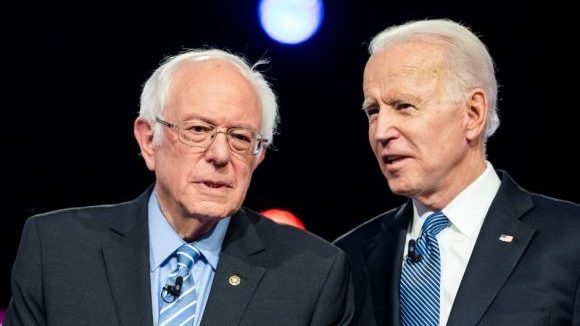
Sanders and Biden vying for the Democratic nomination.
The results of the primary on March 10 certainly point to Joseph Biden becoming, in less than two weeks, the absolute frontrunner among the Democratic contenders for the highest office in the United States. Biden is now assured of the necessary and sufficient conditions to accumulate the support of the 1,991 delegates that will guarantee him to be proclaimed on the first ballot at the Democratic National Convention (July 13-16 in Milwaukee), as the Democratic Party candidate for the presidency of the United States.
Senator Bernard Sanders, the only other contender still active in his presidential bid, has only an open arithmetic probability of accumulating the number of delegates to be nominated as the Democratic Party’s candidate. Since that option is practically unattainable, Sanders has only to give up his aspiration. Therefore, the question to be solved is how and when Sanders will give up his electoral efforts. That decision will be the result of discussions and negotiations, not necessarily public, between both campaign teams, the two challengers and the Democratic leadership.
Among the issues to be considered in these decisions is the time factor, which has begun to run since the March 10 primary results, especially in Washington and Michigan. [These are] states where Sanders was unable to repeat the magnitude of his 2016 primary victories over Hillary Clinton. This decision is important. Once it is made, it will change the pace and content of the election campaign because the cross-party confrontation will be over and the confrontation will be between the Republican Party and the Democratic Party, and particularly between Donald Trump and Joseph Biden.
Of the six states that held primaries on Tuesday, March 10, Biden won three of them by an absolute majority: Michigan (52.9%), Missouri (60.1%) and Mississippi (81%). He also won in Idaho with 48.9% of the vote and a lead of nearly seven thousand votes.
Michigan is a state in the north-central part of the country and will be one of the most disputed states next November. Sanders had won it in the 2016 primaries against Hillary Clinton, when he beat her by winning 49.68%, with a lead of about 18,000 votes. [This time] Biden beat Sanders by more than half a million votes and more than 16%. In Missouri, Biden received 60.1% of the vote against 34.6% for Sanders and a lead of about 170,000 votes. In Mississippi, a state with a very large African-American community, Biden won with 81% of the vote, which is equivalent to more than 160,000 votes.
The results of the Washington primary were disappointing for Sanders. There he had defeated Clinton in 2016 when the election was held in the form of a caucus with 72.72% of the votes. Now he won again, but by a slim margin of 0.2%. The other victory was in North Dakota, which only brings a total of 14 delegates to the National Convention. The victory (if you can call it that) was by a margin close to 14% and less than 2,000 votes ahead: By 2016 Sanders had won that state by about 19%.
With these results, the idea is gaining ground in the minds of Democrats that the goal to be achieved in the November election is to prevent Trump’s reelection, putting aside differences over the electoral agenda on issues such as health care; the establishment of a tax on the rich; the solution of the problem of the university debt; the changes in the national security system and other measures proposed by the “progressives”, “socialists”, “communists” (choose the adjective that you find most convenient and appropriate) that the representatives of the “establishment” consider “radical” and “threatening” to society.
In fact, the results of the primaries held on February 29, March 3 and March 10 are a direct effect of the fears that the dominant sectors within the Democratic Party had about the possibility that Bernard Sanders could accumulate enough delegates to be nominated as a candidate for the presidency in the elections next November. In the last two weeks, we have witnessed an incessant media campaign and political pressure on the various Democratic groups to close ranks and “stop” Sanders.
The problem for the Democratic leadership is how to make this campaign bear fruit in November by transforming it into a mass movement to express at the polls the will to prevent Trump’s re-election.
For now, we can only wait for the “dust” of this political storm to settle so that we can glimpse the future of the current U.S. election campaign.
Sanders recognizes Cuba’s contributions

Bernie Sanders recognizes Cuba’s
contributions in education and health
U.S. Senator Bernie Sanders recognized Cuba’s role in sending doctors around the world, as well as progress in education
————————————————————————————————
Author: Web Editor | internet@granma.cu
February 25, 2020 09:02:35
Translated and edited by Walter Lippmann for CubaNews.
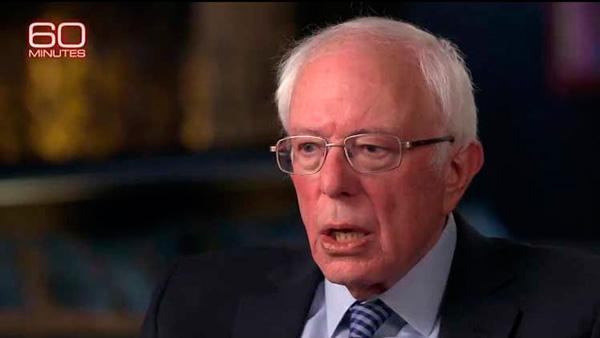
Bernie Sanders: Photo: Prensa Latina
U.S. Senator Bernie Sanders, now one of the strongest Democratic Party candidates for the November presidential election, recognized Cuba’s role in sending doctors around the world.
“It would be a mistake not to declare in Cuba that they have made some good progress in health care,” the 78-year-old politician admitted in an interview with CBS’ 60 Minutes program broadcast Sunday.
“They are sending doctors all over the world. They’ve made some progress in education,” said the Vermont senator who is running against Republican Donald Trump for the Nov. 3 presidential election.
As it turns out, presenter Anderson Cooper asked the current Blue Force nominee to explain his comments in 1985, when he praised some of the social programs implemented by the historic leader of the Cuban Revolution, Fidel Castro.
According to a video clip from more than 30 years ago, the senator said at the time that Fidel Castro “educated the children, gave them medical care, totally transformed society.
Although he made it clear that his “socialism” is not that of Venezuela or Cuba and stressed that the kind of society he believes in is the kind that exists for him in countries like Denmark, Finland and Sweden, the legislator said it is “unfair to simply say that everything is wrong” on the island.
“When Fidel Castro took office, do you know what he did? He had a massive literacy program,” Sanders emphasized, referring to the cultural revolution that in just one year (in 1961) made it possible to eradicate illiteracy and provide universal access to the various levels of education free of charge in the Caribbean country.
On October 17, 1962, during the inauguration of the Victoria de Girón Institute of Basic and Pre-clinical Sciences in the Cuban capital, Fidel Castro announced the government’s decision to provide aid in the field of health and said that 50 doctors would be sent to Algeria.
“Today we can only send 50, but in eight or 10 years, who knows how many, and we will be helping our brothers,” the Cuban leader warned at the time.
Almost six decades later, more than 400,000 health workers from the Greater Antilles have carried out missions in some 164 countries, while with the same disinterest 35,613 health professionals from 138 nations have been trained on the island free of charge.
As expected, his comments provoked the anger of the most extremist sector of Cuban Americans in South Florida, who oppose any rapprochement with the Caribbean island.
In 2016, Sanders defended diplomatic relations with Cuba, which he said “will result in significant improvements in the lives of Cubans and help the United States.’
In addition, he has reiterated his position regarding the elimination of the blockade that both Republican and Democratic administrations have maintained for nearly six decades.
But watch out, warn observers, his praise must be viewed with caution, despite the fact that it differs from Trump.
By the way, during the televised program, Sanders, who describes himself as a democratic socialist, promised that if he becomes president he hopes to use the “federal government to protect the interests of working families.”
In that sense, he stated that in the United States the government works for the very wealthy and although without mentioning his name he said that the president of the United States is a pathological liar.
In early February, in his State of the Union address, the occupant of the Oval Office attacked Medicare for All, one of Sanders’ main proposals.
For the Republican, this health plan seeks to destroy American health care.
Recent polls show that Sanders continues to be unstoppable, winning comfortably in Nevada’s Democratic caucuses on Saturday, and increasing his support among Latino voters, second only to former Vice President Joseph Biden.
Source: Prensa Latina
Bernie Sanders, the Most likely Democrat Bet in America Against Trump

Bernie Sanders, the Most likely Democrat in America Against Trump
Senator Bernie Sanders is shaping up today to be the Democrats’ most likely bet to face President Donald Trump in the November 2020 election
February 23, 2020
Translated and edited by Walter Lippmann for CubaNews.
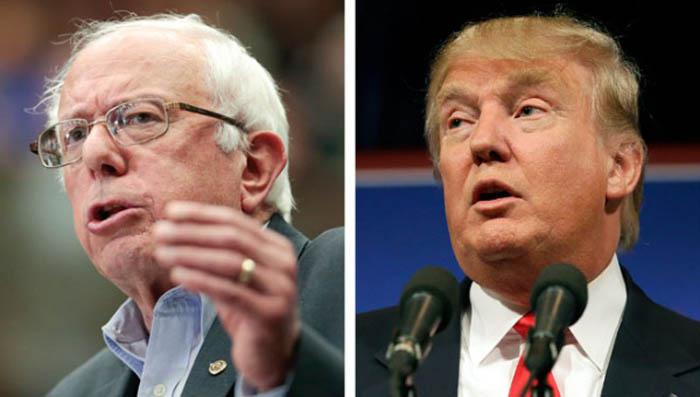
From left to right, Democrat Bernie Sanders and Republican Donal Trump. Photo: EFE
If weeks ago the media highlighted the figure of the former mayor of New York and multimillionaire Michael Bloomberg as an alternative to the “establishment” and moderate Democrats to confront President Donald Trump, today the figure of the senator is making its way as a representative of diversity in the country.
His successes in the early states gave him a clear path to a plurality of committed convention delegates, while his rivals are divided and attempts to reach a contested convention appear to be going in the wrong direction, according to various U.S. media.
As with Donald Trump in 2016, so it is Sanders so far in 2020. The characters are different, but the same dynamic is at play.
The reality facing those in the so-called blue party who do not want the senator from Vermont to run is the division in their ranks. This makes it extremely difficult to stop a candidate if no alternative can be agreed upon, whether it is former vice president Joseph Biden, Bloomberg or another of those still competing.
According to analyses in such influential media as The New York Times and The Hill, the race is young and there is still time for “conservatives who opposed Trump to offer some advice to Democrats who want to nominate someone other than the Vermont socialist,” says the Times.
After the pointer’s passage through the blue ranks, the idea is now underway that figures like fellow challenger Amy Klobuchar, former Mayor Pete Buttigieg and even former Vice President Biden, if he loses in South Carolina, will drop from the race to give possibilities to alternative figures like Bloomberg or Senator Elizabeth Warren.
According to Ross Douthat, author of several books such as “The Decadent Society,” those who are against Sanders are not united, but that could happen if moderate alternatives such as Bloomberg or Biden are considered, since it is difficult to stop a candidate from the Sanders plurality at a contested convention.
The Democrats’ delegate distribution rules make a contested convention more likely, but Sanders is on track to get a clear plurality of delegates by the end of March, and one thing that would be critical is whether he arrives in May with a majority of delegates.
The chances of the new frontrunner gaining more support are real. Some analysts, such as the site www.fivethirtyeight.com, even consider his pace to be overwhelming and he will arrive at the party convention with a large margin in his favor to be the nominee who will face Donald Trump on November 3 for the presidency.
The diversity of the vote in the race will determine what happens on Super Tuesday. That could consolidate Sanders, because on March 3 there are two delegate awards, in California (495) and Texas (261), and there Latinos can have the last word.
In the race to win the nomination in July, contestants are trying to make it to the party convention with the support of 1,991 delegates needed out of the total of 4,750 to be their party’s nominee for the November presidential election.
As things are going, Sanders could get there with that number. The race, however, is still in its infancy and a showdown between Sanders and Biden, or even Bloomberg, for the nomination is not ruled out, although Sanders probably has the advantage.
In Bloomberg’s case, Super Tuesday is still ahead when he will start appearing on the ballot, but after his disastrous performance in last Wednesday’s debate in Nevada, his chances are in doubt.
According to the polls, Sanders leads in both California and Texas. The progressive senator could also take advantage of those advantages in the next few days, after his momentum in the first states where they voted so far.
The reality is that the existence of eight candidates now makes it difficult for any rival to reach the top and challenge Sanders, which is likely to increase the pressure on some under-performing candidates to withdraw.
The truth is that there is panic among opponents and pressure for an alternative to Sanders is on, so eyes are on the Super Tuesday results, when the Democratic competition to challenge Trump will definitely be closed or opened.
(Source: Prensa Latina)
Sanders vs. Bloomberg in Las Vegas

Sanders vs. Bloomberg:
The Debate to Choose Who Will Run Against Trump
Former New York Mayor Michael Bloomberg came under fire Wednesday in his first televised debate of the Democratic race, the most virulent of the campaign to choose who will run against Donald Trump for the White House in November
———————————————————————————–
By Web Editor | internet@granma.cu
February 20, 2020 10:02:45
Translated and edited by Walter Lippmann for CubaNews.
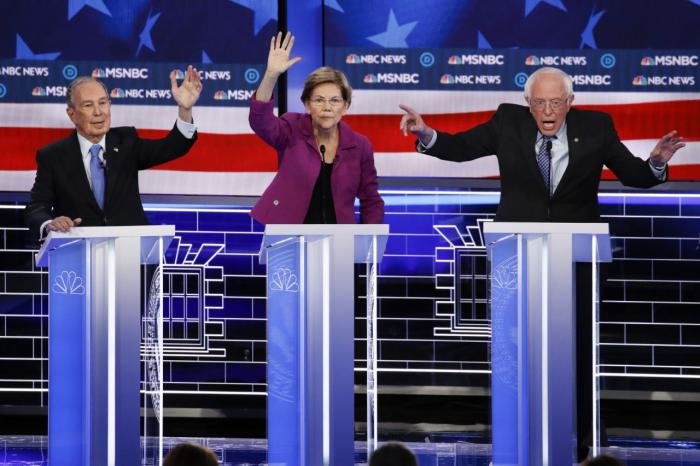
The Democratic presidential debate in Las Vegas was the debut of Mike Bloomberg and the first in which Bernie Sanders appeared as a leading figure. Photo: AP
Former New York City Mayor Michael Bloomberg came under fire Wednesday in his first televised debate of the Democratic race. It was the most virulent of the campaign to choose who will run against Donald Trump for the White House in November.
Before Saturday’s caucus in Nevada, the third state to hold its party caucus, the Las Vegas showdown was the most controversial of the nine so far, as leftist Bernie Sanders is the clear favorite among the eight contenders still in the race.
Bloomberg, who invested astronomical amounts in advertising that catapulted him to third place in the Democrats’ voting intention in just three months of the contest, was labeled an “arrogant millionaire” and questioned for “sexist remarks” and “racist policies.
Sanders, who won in New Hampshire and came a close second in Iowa, was also targeted, particularly for his universal health plan, but also for his leadership style and economic proposals.
“I don’t think there’s any chance the senator will beat President Trump,” Bloomberg said.
But Sanders was not far behind.
“Mike Bloomberg has more wealth than 125 million Americans underneath him,” the senator said in one of the many bumps and bruises of the evening. “That’s wrong. That’s immoral.”
With an estimated fortune of $64.2 billion, the financial information mogul is considered the eighth richest person in the world according to Forbes’ updated figures.
Another strong exchange between the two was when Bloomberg questioned the economic claims of Sanders, who defines himself as a “democratic socialist”.
“We’re not going to throw away capitalism,” the businessman said. “Other countries tried. It was called communism and it just didn’t work,” he added, a mention that Sanders called a “low blow”.
Sanders leads the race with 32% support, ahead of Barack Obama’s former vice president, moderate Joe Biden, at 16%, and Bloomberg at 14%, according to a Washington Post-ABC News poll released Wednesday.
In fourth place is progressive Senator Elizabeth Warren (12%), followed by two other centrists: former Mayor Pete Buttigieg (8%) and Senator Amy Klobuchar (7%).
“We shouldn’t have to choose between a candidate who wants to burn this party and one who wants to buy this party,” said Buttigieg, who won in Iowa and came in a close second in New Hampshire.
“Let’s choose someone who is actually a Democrat,” he added, in a setback for the independent Sanders and for Bloomberg, who was a Democrat before running for mayor as a Republican and as an independent, to finally return to the Democratic Party in 2018.
In an unusual strategy, Bloomberg decided to skip the first four dates of the competition — Iowa, New Hampshire, Nevada on Saturday and South Carolina on February 29 — to focus on the “Super Tuesday” of March 3, when 14 states vote and a one-third majority of delegates (1991) must choose the party’s nominee at the Democratic convention in July.
Bloomberg, who is shaping up to be a strong contender against Trump, another 70-something white New York mogul like himself, also was whipped by Warren, who like Klobuchar is struggling to stay afloat.
“Understand this: Democrats are taking a big risk if we just replace one arrogant billionaire with another,” he warned, equating Bloomberg with Trump by recalling that the former mayor once referred to women as “fat broads” and “horse-faced lesbians.
“Democrats are not going to win if we have a nominee who has a history of hiding his tax returns, harassing women and supporting racist policies,” he said.
During his tenure in New York, Bloomberg implemented a policy of arbitrary arrests and searches (“stop-and-frisk”), which his critics say affected Blacks and Latinos much more and for which the candidate has apologized.
“It got out of control,” he said Wednesday in Las Vegas, acknowledging that the issue “really” embarrassed him.
Despite being on the defensive several times, Bloomberg maintained his composure and his firmness, presenting himself as someone capable of defeating Trump and of governing the United States.
From a rally in Arizona, Trump took the opportunity to mock Bloomberg, whom he nicknamed “Mini” in reference to his height. “I hear you’re getting beat up tonight,” he said.
And after dismissing “Crazy Bernie” as a potential contender, he said, “We don’t care who the hell he is because we’re going to win,” as the crowd chanted “Four more years!
(AFP)
Sanders Wins New Hampshire Primary

Bernie Sanders Wins New Hampshire Democratic Primary
Sanders showed his support among Democrats and took more than 25 percent of the vote
Author: Web Editor | internet@granma.cu
February 12, 2020 12:02:31
Translated and edited by Walter Lippmann for CubaNews.
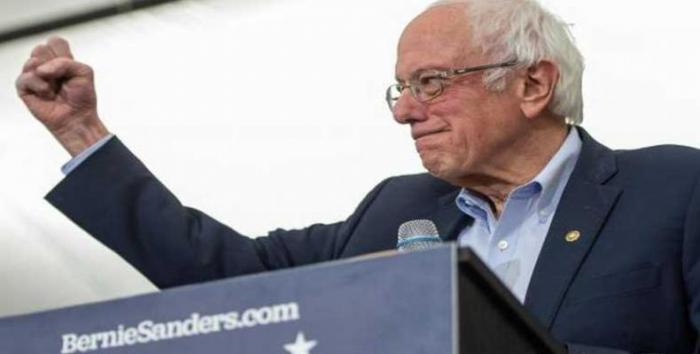
Photo: Radio Havana Cuba
The Democratic primary left Bernie Sanders in New Hampshire as the winner today and turned around the result of the February 3 Iowa caucus, which gave an advantage to former South Bend, Indiana Mayor Pete Buttigieg.
Gone is the chaotic assembly of nine days ago, whose late delivery of results due to a computer error led to all sorts of criticism and suspicion of the Democratic Party.
In the New Hampshire election, Sanders confirmed his status as favorite among the Democrats and took more than 25 percent of the vote, while Buttigieg came in second place.
On his Twitter account, Sanders announced, “Our victory in New Hampshire is not about me. It’s about us. It’s about the movement our grassroots supporters, volunteers and donors built that will transform this country.”
Minnesota Senator Amy Klobuchar surprised the crowd and placed third in the vote count.
Only these three candidates earned delegates in this nomination contest to find President Donald Trump’s rival in November.
For a pre-candidate to get delegates, they had to win at least 15 percent of the vote,. This was a condition that was not met by, for example, Senator Elizabeth Warren, who did not get even 10 percent.
While the progressive Sanders led the Democratic presidential primary Tuesday, now former favorite Joe Biden suffered another major setback that now raises doubts about the viability of his campaign.
In the second nomination contest to find Donald Trump’s opponent, the former vice president was fifth, far behind the first choices and behind contenders such as Warren and Klobuchar. In Iowa, Biden had been fourth.
As if anticipating the disappointing result, Biden left New Hampshire and headed to South Carolina long before the results began to be known.
Biden, 77, did poorly in two previous presidential nominations before winning the 2008 election as President Barack Obama’s number two.
Now he hopes to stay afloat at least until the Feb. 29 elections in South Carolina and a series of contests in other southern states on so-called “Super Tuesday” of March 3.
Businessman Andrew Yang and Senator Michael Bennett dropped out of the race for the Democratic nomination, due to poor results in the Iowa caucus and New Hampshire primary.
Their withdrawal leaves nine Democratic candidates in the presidential race: Bernie Sanders, Pete Buttigieg, Amy Klobuchar, Elizabeth Warren, Joe Biden, Mike Bloomberg, Tulsi Gabbard, Tom Steyer and Deval Patrick.
(Prensa Latina)
Trump’s Impact on U.S. Youth
Trump’s Impact on US Youth

By Manuel E. Yepe
http://manuelyepe.wordpress.com/
Exclusive for the daily POR ESTO! of Merida, Mexico.
Translated and edited by Walter Lippmann.
It’s easy to imagine the formidable negative impact that the presidency of the energetic Donald Trump may be having on America’s youth.
In every action, every gesture, and every word of his behavior as head of the nation that rules the destiny of the capitalist world, Trump sends signals that being racist, sexist, homophobic, or misogynist is a merit equivalent to an honorary badge.
Historically, inept presidents are challenged, among other defects, for being liars, spoiled and rude, which are precisely the adjectives that most “adorn” Donald Trump’s daily behavior.
This is highlighted in a new book entitled The Fixers, which examines the relationship between Trump and Roy Cohn (1927-1986), an American lawyer who was best known for being Senator Joseph McCarthy’s chief advisor during the anti-Communist Senate hearings held by the Army and Senator McCarthy himself in the 1950s.
It was Cohn who orchestrated the McCarthyite persecutions of suspected communists that later extended to homosexuals. Thousands and thousands of Americans were subjected to police and legal investigations. Their lives, families, and careers were destroyed as a result.
Later, Cohn would become the personal lawyer of Donald Trump, the current president of the American nation. Roy Cohn was publicly homophobic and encouraged public persecution of homosexuals. It is now known that he himself was a homosexual man and died in 1986 at the age of 49 due to AIDS-related complications.
Trump had “distanced himself” from Cohn after he became ill. However, the President organized a “farewell dinner” in his luxurious Mar-a-Lago club shortly before his death from AIDS, according to the book mentioned above.
The book states that Trump would later recall Cohn’s visit when, in 2016, he jokingly told guests at his club that he had to have Mar-a-Lago sprayed after the man’s visit because he was dying of an AIDS-related illness. “I had to spend a fortune to fumigate all the dishes and silverware in this place,” he said amid jokes.
In an excerpt from the book published in the Wall Street Journal, authors Joe Palazzolo and Michael Rothfeld wrote that Cohn, as Trump’s first fixer, “manipulated the media and the legal system to secure business advantages for Mr. Trump. “He passed his client off as a fabulously successful developer who transformed his father’s collection of low-cost apartment buildings in Brooklyn and Queens into a Manhattan-based luxury condominium tower empire.
Trump’s views on the media and celebrities were shaped by Cohn and his successors, people he trusted to project a particular version of himself that often bore little resemblance to reality.
“Their careers with Mr. Trump shed light on his rise in public life and his victory in the 2016 presidential election. In 2017, recordings emerged of President Trump joking that he forced Princess Diana to take an HIV test before having sex with her. Trump made such horrific comments shortly after Princess Diana’s death in 1997, in a radio interview with athlete Howard Stern. When Cohn died of AIDS in 1986, his biography was as fascinating as it was despicable. His life journey made him more like a movie villain than a royal lawyer. Which might be funny if it weren’t for the fact that the consequences of his worst acts still reverberate throughout the world.
After graduating from law school at the age of 20, Cohn made a name for himself by prosecuting the couple Ethel and Julius Rosenberg on espionage charges. Even then, he set aside ethics to ensure that the Jewish couple would not only be found guilty but also sentenced to death and executed, even though the evidence was clearly insufficient to do so.
Throughout the 1950s, he became McCarthy’s right-hand man during the witch-hunt and the lawyer for mob boss Anthony Salerno. Two moves that propelled him into the circles of power – and corruption – in New York. His figure was something like a bridge between the bosses of organized crime and the politicians and businessmen who had to deal with them.
His lack of scruples and his bellicose ways made him a notorious character, who surrounded himself with the most prominent people in the country: celebrities, communication magnates, the Reagans… and Donald Trump.
The two men first joined forces when Trump, then a young construction entrepreneur, was sued, along with his father, for refusing to rent his apartments to Black tenants. Contrary to Cohn’s initial opinion, Trump settled with the plaintiffs, not without first suing the government for $100 million. Trump had learned one of Cohn’s golden rules: “never admit you’re wrong and never apologize.”
Subscribe to Blog via Email
| M | T | W | T | F | S | S |
|---|---|---|---|---|---|---|
| 1 | ||||||
| 2 | 3 | 4 | 5 | 6 | 7 | 8 |
| 9 | 10 | 11 | 12 | 13 | 14 | 15 |
| 16 | 17 | 18 | 19 | 20 | 21 | 22 |
| 23 | 24 | 25 | 26 | 27 | 28 | 29 |
| 30 | 31 | |||||


You must be logged in to post a comment.